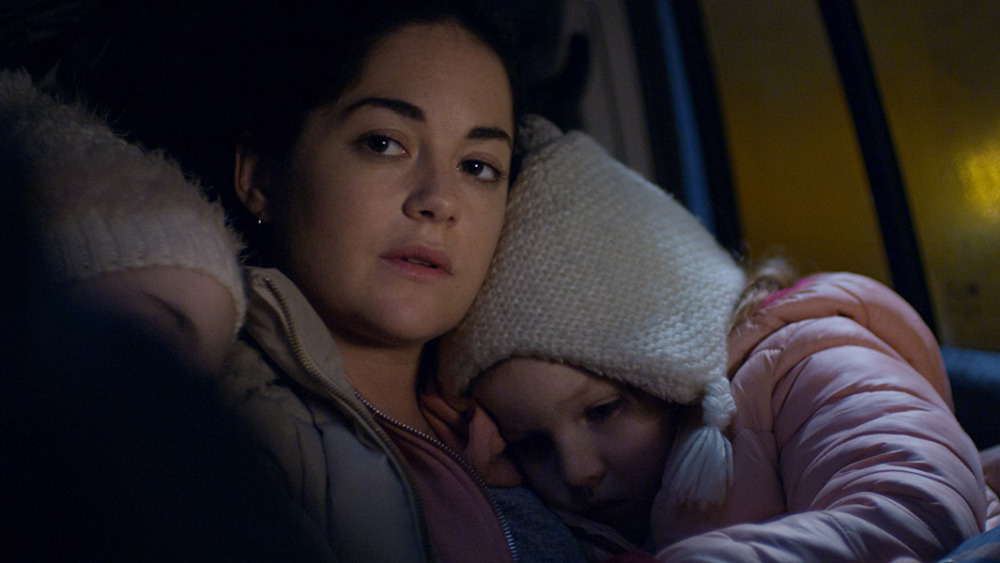ROSIE
Blue Fox Entertainment
Reviewed for Shockya.com & BigAppleReviews.net linked from Rotten Tomatoes by: Harvey Karten
Director: Paddy Breathnach
Screenwriter: Roddy Doyle
Cast: Sarah Greene, Molly McCann, Darragh McKenzie, Ruby Dunne, Ellie O’Halloran
Screened at: Critics’ link, NYC, 6/27/19
Opens: July 19, 2019
Movies with Hollywood endings—to the extent that they still exist in our cynical times—conclude with a victory by the good guys over the bad. Director Paddy Breathnach appears to have no use for the formula in “Rosie,” where the good guys, the deserving poor, are down for the count, or at least to the count of eight, and the villains, in this case greedy landlords, couldn’t care. But this is no 007 thriller; on the contrary. It’s a film where the only melodrama arises when one of the title character’s four kids goes missing, and we in the audience cannot be blamed if we think that she has been kidnapped. But imagine a kidnapper’s hearing that the entire family is close to dead broke, living in their car, made up of six Dubliners who are polite. Rosie always says “Tanks” when phone calls bear no results and daddy John Paul works hard as a dish washer in an upscale restaurant in Ireland’s capital city.
“Rosie” is a film that can be appreciated even here in the U.S. as well as in many a European city at a time that greedy landlords are taking advantage of an economic boom, throwing out rent-paying tenants in favor of the young upscale professionals who can pay handsomely. Rosie Davis herself, played by a remarkable Sarah Greene, a stage actress (she once played opposite Daniel Radcliffe on Broadway in Martin McDonagh’s “The Cripple of Inishmaan”), anchors a family of six who have just been tossed out of their affordable digs when the landlord sees opportunities to make more. She lives in her car with her husband, John Paul Brady (Moe Dunford) and their four kids—ages thirteen, eight, six and Madison—the young fry for the most part restraining their whines but occasionally testing the patience of their parents.
The film follows the Greek unities—all taking place within 36 hours, a single plot and a single location (Dublin)—the plot testing both the anger of a left-leaning movie audience wondering why a newly-rich country cannot place citizens in a home with affordable rent, and the contempt of right-wingers who may wonder why a couple with a stay-at-car mum and a dishwasher dad would wind up with four children—and possibly counting. The Dublin City Council does lend a helping hand, not enough, allowing Rosie to use government vouchers as payments for motels that are on a list that will accept the homeless. The trouble is that this little experiment in socialism cannot succeed for everyone since only a limited number of hotel managers are willing to accept the low payments. (Aside: this may make some of us moviegoers wonder what would happen if a President Bernie or President Elizabeth succeeds in winning Medicare for all only to find that half the doctors will not accept the lower payments that Medicare allows vs. private insurers.)
For the bulk of the movie, watch Rosie compulsively using her cell to reserve places for six people only to discover that virtually none of the managers is willing to provide shelter for them for more than single night, if even that. As in the U.S. homeless kids are bullied in school, specifically Millie (Ruby Dunne) is called “Smelly Millie” though her mom tells the teachers that she is always clean. Rosie has way out but she’s too stubborn. Her mother (Pom Boyd) is willing to take the kids into her big house but demands that Rosie apologize for accusing her late father of abuse.
Roddy Doyle’s script may remind cinephiles of his original story for “The Commitments,” a musical based on the culture of a coastal community in New South Wales while director Breathnach’s most recent helming of “Viva” considers a hairdresser who must stop performing in a local drag club when his estranged father returns. “Rosie” will make you think of the usual themes of Ken Loach, whose social realism is best seen in “I, Daniel Blake,” in which a 59-year-old carpenter who, after having a heart attack, must jump bureaucratic hoops to get government support. But Loach’s story is filled with melodramatic flourishes while “Rosie” needs an audience willing to absorb the lessons of gentrification’s cruelties without the heart-pounding excitements of a kidnapping, a murder, a violent argument and the like.
The Irish accents used by the English-speaking cast are not as difficult to understand as Glaswegian, but still, for an American audience, subtitles would have made a difference.
86 minutes. © 2019 by Harvey Karten, Member, New York Film Critics Online
Story – B+
Acting – B+
Technical – C+
Overall – B

